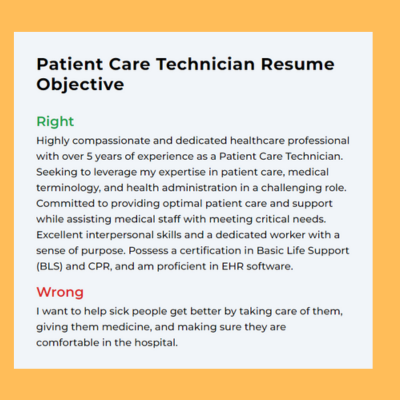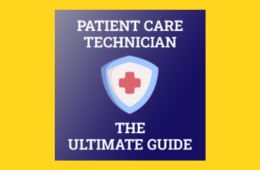Patient Care Technicians (PCTs) are an essential part of the healthcare industry, providing direct care to patients under the supervision of registered nurses (RNs) and other healthcare professionals. PCTs are responsible for a variety of tasks, including taking vital signs, bathing and feeding patients, and assisting with medical procedures. They play a crucial role in ensuring that patients receive the highest quality of care possible.
To become a PCT, individuals must complete a training program and obtain certification. The educational requirements for becoming a PCT vary depending on the state and employer, but typically include a high school diploma or equivalent, as well as completion of a PCT program. These programs can be found at vocational schools, community colleges, and hospitals, and typically take between six months and one year to complete. Upon completion of a PCT program, individuals must pass a certification exam to become a certified PCT.
Key Takeaways:
- Patient Care Technicians (PCTs) provide direct care to patients under the supervision of registered nurses (RNs) and other healthcare professionals.
- To become a PCT, individuals must complete a training program and obtain certification.
- PCT programs can be found at vocational schools, community colleges, and hospitals, and typically take between six months and one year to complete.
Understanding Patient Care Technicians
Patient Care Technicians (PCTs) are healthcare professionals who play a vital role in patient care. They work under the supervision of registered nurses (RNs) and licensed practical nurses (LPNs) to provide basic patient care. PCTs are responsible for performing various tasks such as taking vital signs, assisting with patient mobility, and providing basic emotional support.
Role and Responsibilities
The role of PCTs is multifaceted. They are responsible for ensuring that patients receive the best possible care. PCTs work alongside RNs and LPNs to provide basic patient care, such as bathing, dressing, and feeding patients. They also take vital signs, such as blood pressure, pulse, and temperature. PCTs are responsible for monitoring patients’ conditions and reporting any changes to the RN or LPN. They also assist with patient mobility, such as transferring patients from their beds to wheelchairs and vice versa.
Work Environments
PCTs work in a variety of healthcare settings, such as hospitals, clinics, and long-term care facilities. They work in a fast-paced, high-stress environment that requires them to be able to multitask and work well under pressure. PCTs work closely with RNs and LPNs, as well as other healthcare professionals such as doctors, physical therapists, and occupational therapists.
In conclusion, PCTs are essential members of the healthcare team who provide basic patient care and support under the supervision of RNs and LPNs. They work in a variety of healthcare settings and are responsible for ensuring that patients receive the best possible care.

Educational Pathways
Required Education
To become a Patient Care Technician (PCT), a high school diploma or GED is required. PCTs must also complete a training program, which usually takes a few months to a year to complete. The training program can be found at technical schools, community colleges, or vocational schools. It is important to note that some employers may require a higher level of education, such as an Associate’s degree.
Certification Programs
Certification is not required to become a PCT, but it is highly recommended as it can increase job opportunities and earning potential. There are several certification programs available, such as the National Healthcare Association’s (NHA) Certified Patient Care Technician/Assistant (CPCT/A) and the National Center for Competency Testing’s (NCCT) Patient Care Technician/Assistance (PCT/A) certification.
To be eligible for certification, candidates must have completed a PCT training program and have a high school diploma or GED. Certification exams typically cover topics such as patient care, communication, and safety. Once certified, PCTs must maintain their certification by completing continuing education courses and renewing their certification every few years.
Overall, completing a PCT training program and obtaining certification can lead to a fulfilling career as a PCT.
Skills and Qualifications
Essential Skills
Patient care technicians (PCTs) require a range of skills to perform their duties effectively. They need to have excellent communication skills to interact with patients, families, and other healthcare professionals. PCTs should be able to read and write in English and have basic computer skills to document patient care accurately.
PCTs must be detail-oriented and organized to keep track of patients’ medical records and other important information. They should have good critical thinking skills to identify and solve problems quickly. PCTs should be able to work well under pressure and handle stressful situations with ease.
Physical and Emotional Requirements
PCTs should be in good physical condition as they may need to lift, move, or transfer patients. They should have good hand-eye coordination and dexterity to perform tasks such as taking vital signs, drawing blood, and administering medications. PCTs should be able to stand, walk, and bend for long periods.
PCTs should also possess emotional intelligence and empathy to provide emotional support to patients and their families. They should be able to remain calm and composed in difficult situations and be able to handle patients who may be confused, agitated, or combative.
In addition, PCTs should have a high school diploma or equivalent and complete a training program to become certified. They should be familiar with medical terminology and have a basic understanding of human anatomy and physiology. Some states may also require PCTs to have a valid driver’s license and pass a background check.
Overall, PCTs play a vital role in the healthcare industry, and possessing the essential skills and qualifications is crucial to their success in this field.
The Certification Process
To become a certified Patient Care Technician (PCT), there are certain eligibility criteria that must be met.

Eligibility Criteria
The National Healthcareer Association (NHA) is the largest certifying agency for PCTs, but there are other certification options available as well. To be eligible for certification, candidates must have a high school diploma or equivalent, and must have completed a PCT training program. These programs can be found at community colleges, vocational schools, and some hospitals.
Examination and Evaluation
After completing the training program, candidates must pass the certification exam. The exam consists of 100 multiple-choice questions and covers topics such as patient care, medical terminology, infection control, and safety. Candidates have two hours to complete the exam and must achieve a passing score of 70% or higher.
Once certified, PCTs must maintain their certification by completing continuing education courses and renewing their certification every two years.
It is important to note that certification is not required to work as a PCT, but it can increase job opportunities and earning potential.
Career Advancement and Opportunities
Becoming a Patient Care Technician (PCT) is just the beginning of a career in healthcare. There are many opportunities for career advancement and specialization within the field.
One common path for PCTs is to become a Certified Nursing Assistant (CNA). CNAs have additional responsibilities such as taking vital signs, dressing wounds, and administering medication. They also have a higher salary and more opportunities for career growth.
Another option for PCTs is to become a Licensed Practical Nurse (LPN). LPNs have more advanced clinical skills and can perform tasks such as starting IVs and administering medication. They also have more autonomy in patient care and can work in a variety of healthcare settings.
PCTs can also choose to specialize in a specific area of healthcare. For example, they can become a Dialysis Technician, working specifically with patients who have kidney disease. They can also become a Phlebotomy Technician, specializing in drawing blood and collecting specimens.
Continuing education is key to career advancement in healthcare. Many PCTs choose to further their education by pursuing an Associate’s or Bachelor’s degree in nursing. This allows them to become a Registered Nurse (RN) and have even more opportunities for career growth and specialization.
Overall, there are many opportunities for career advancement and specialization within the field of healthcare for PCTs. With dedication and continuing education, PCTs can have a fulfilling and rewarding career in healthcare.

Frequently Asked Questions
What are the typical responsibilities of a Patient Care Technician?
Patient Care Technicians (PCTs) play an important role in healthcare by providing basic care and support services to patients in hospitals and other healthcare settings. Some of the typical responsibilities of a PCT include taking vital signs, checking and recording medical information, providing basic patient care, assisting with medical equipment, and helping with patient activities of daily living.
What certification is required to work as a Patient Care Technician?
To work as a certified PCT, candidates must complete a training program, gain hands-on experience, and pass a certification exam. There are several certification options available, including the National Healthcareer Association’s (NHA) Certified Patient Care Technician (CPCT) exam and the National Center for Competency Testing’s (NCCT) Patient Care Technician/Assistant (PCT/A) exam.
How long does the training process take for a Patient Care Technician?
The length of the training process for a PCT can vary depending on the program and the individual’s schedule. Most training programs take between 4-12 weeks to complete. During this time, students will learn about medical terminology, patient care techniques, infection control, and other important topics.
Can you obtain Patient Care Technician certification online?
Yes, there are several online training programs available that can prepare students for the PCT certification exam. However, it is important to ensure that the program is accredited and recognized by the certification board before enrolling.
What is the difference between a Patient Care Technician and a Certified Nursing Assistant (CNA)?
While PCTs and CNAs both provide basic care and support services to patients, there are some key differences between the two roles. PCTs generally have a broader range of responsibilities and may perform more technical tasks, such as operating medical equipment. CNAs typically focus more on personal care tasks, such as bathing and dressing patients.
What is the average salary range for a Patient Care Technician?
According to Salary.com, the average patient care technician salary in the United States is $35,972, with a range between $31,352 and $39,503. However, the salary you can earn as a PCT depends on a variety of factors, including your years of experience, level of education, certifications, and other skill sets you bring to the job.

